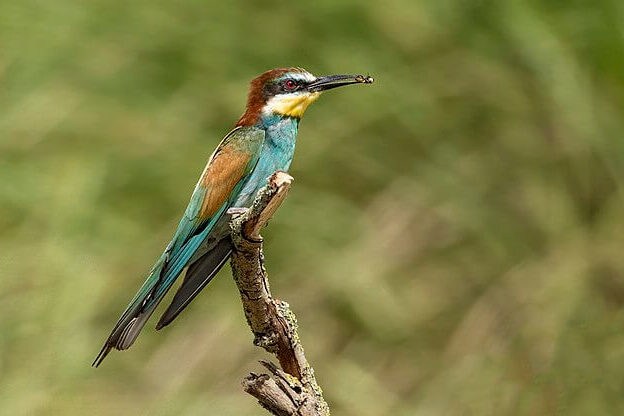
British enthusiasts have been delighted to witness the exotic European Bee-Eater gracing Norfolk’s disused quarry for the second consecutive summer.
In the skies of Morocco, Tunisia, Algeria, and Spain, it is normal for the striking sight of European bee-eaters, adorned with vibrant plumage of cherry red, ultramarine, turquoise, and yellow, darting like multicoloured gems. Their tropical allure is capturing the attention of birdwatchers.
This unique occurrence marks the first time the bee-eaters have returned to nest in the same British location for two years in a row. The sighting of a nesting pair and an additional bee-eater in the sand quarry near Cromer has generated anticipation that more might join their ranks. Last year, eight of these remarkable birds made the quarry their home, successfully hatching and nurturing chicks before embarking on their journey southward.
While the bee-eaters’ return brings excitement, it comes with a poignant reminder of the Earth’s changing climate. Observers and experts view this as a clear indication of the profound impact climate change has on our planet.
“Bee-eaters have generally turned up in the UK on a very ad hoc basis, so far never reusing the same nest site twice,” said Mark Thomas of the RSPB.
“Their return is a vivid reminder of the changes being wrought by our overheating planet. Bee-eaters are a species found commonly in the southern Mediterranean and northern Africa, and as our planet warms they – along with other species – are being pushed further north.”
Formerly a rare breeding sight in the UK, this year marks the seventh breeding attempt in England over the past two decades. The bee-eaters’ persistence in establishing a regular breeding colony in the UK reflects the influence of altering environmental conditions.
Feeding on bees, dragonflies, and other airborne insects, the bee-eaters are likely to grace the Norfolk area until the end of summer. Thereafter, they will embark on their annual migratory journey to southern Africa to spend the winter months.
As nature unfolds its breathtaking displays, these European bee-eaters serve as both a symbol of tropical glamour and a poignant reminder of the delicate balance between wildlife and our changing planet. Observers and enthusiasts alike await with wonder the next chapter in this extraordinary tale of avian resilience and adaptability.
——————————————————————————
At Natural World Fund, we are passionate about stopping the decline in our wildlife.
The declines in our wildlife is shocking and frightening. Without much more support, many of the animals we know and love will continue in their declines towards extinction.
When you help to restore a patch of degraded land through rewilding to forests, meadows, or wetlands, you have a massive impact on the biodiversity at a local level. You give animals a home and food that they otherwise would not have had, and it has a positive snowball effect for the food chain.
We are convinced that this is much better for the UK than growing lots of fast-growing coniferous trees, solely to remove carbon, that don’t actually help our animals to thrive.
This is why we stand for restoring nature in the UK through responsible rewilding. For us, it is the right thing to do. Let’s do what’s right for nature!
Donate today at https://naturalworldfund.com/ and join in the solution!

